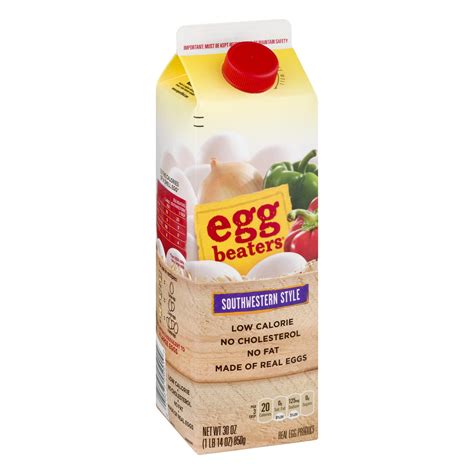Egg beaters, a popular breakfast alternative, have been a staple in many households for decades. Made from egg whites, egg beaters are often considered a healthier option compared to traditional eggs. But what exactly are the nutritional facts and health benefits of egg beaters? In this article, we will delve into the world of egg beaters, exploring their nutritional content, health benefits, and potential drawbacks.
What are Egg Beaters?
Egg beaters are a type of egg substitute made from egg whites, which are the clear liquid part of an egg. They are often sold in liquid or frozen form and can be used as a direct substitute for eggs in recipes. Egg beaters are typically made from a combination of egg whites, water, and other ingredients such as salt, yeast extract, and vegetable oil.

Nutrition Facts of Egg Beaters
Egg beaters are relatively low in calories and fat, making them a popular choice for those watching their weight or following a low-fat diet. According to the USDA, one large egg white ( approximately 30 grams) contains:
- Calories: 17
- Protein: 3.6 grams
- Fat: 0 grams
- Cholesterol: 0 milligrams
- Sodium: 1 milligram
- Carbohydrates: 0.2 grams
In comparison, one large whole egg contains:
- Calories: 70
- Protein: 6.3 grams
- Fat: 5 grams
- Cholesterol: 186 milligrams
- Sodium: 62 milligrams
- Carbohydrates: 0.6 grams
Health Benefits of Egg Beaters
Egg beaters offer several health benefits, making them a great addition to a balanced diet. Some of the key benefits include:
1. High-Quality Protein
Egg beaters are an excellent source of protein, which is essential for building and repairing muscles, organs, and tissues in the body. Protein also helps to keep you full and satisfied, making it an ideal choice for those trying to lose weight.
2. Low in Calories and Fat
Egg beaters are extremely low in calories and fat, making them an excellent choice for those watching their weight or following a low-fat diet. They are also a great option for those who want to reduce their cholesterol intake.
3. Rich in Vitamins and Minerals
Egg beaters are a good source of several vitamins and minerals, including vitamin B12, riboflavin, and selenium. These nutrients are essential for maintaining healthy red blood cells, nerve function, and immune function.
4. Supports Heart Health
Egg beaters are low in cholesterol and saturated fat, making them a heart-healthy choice. They are also a good source of potassium, which can help to lower blood pressure and reduce the risk of heart disease.
Potential Drawbacks of Egg Beaters
While egg beaters offer several health benefits, there are also some potential drawbacks to consider:
1. Lack of Essential Nutrients
Egg beaters are often stripped of essential nutrients like vitamin D, vitamin B12, and omega-3 fatty acids, which are found in whole eggs. These nutrients are essential for maintaining healthy bones, brain function, and heart health.
2. May Contain Additives
Some egg beaters may contain additives like sodium benzoate, a preservative that can be detrimental to health in large quantities.
3. May Not Be Suitable for Everyone
Egg beaters may not be suitable for everyone, particularly those with egg allergies or intolerances. Additionally, some egg beaters may contain gluten or other allergens, making them unsuitable for those with gluten intolerance or sensitivity.
Gallery of Egg Beaters Nutrition and Health Benefits






FAQs
What are egg beaters made of?
+Egg beaters are made from egg whites, which are the clear liquid part of an egg.
Are egg beaters a good source of protein?
+Can I use egg beaters as a substitute for whole eggs?
+In conclusion, egg beaters are a nutritious and versatile breakfast alternative that offers several health benefits. While they may lack some essential nutrients found in whole eggs, they are an excellent source of protein and can be a great addition to a balanced diet. Whether you're looking to reduce your cholesterol intake or increase your protein consumption, egg beaters are a great option to consider.
